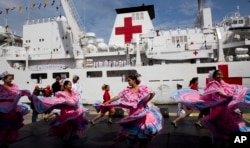China has finished work on a 14,300-ton medical vessel, dubbed the "Peace Ark,” that can rescue distressed foreign boats, possibly in Asia’s most heavily disputed sea, and help improve Beijing’s tattered reputation among regional governments.
Beijing has upset a swathe of Asia since 2010 by landfilling small islets in the contested South China Sea for military use. Brunei, Malaysia, Taiwan Vietnam and the Philippines all overlap parts of the Chinese claims to the 3.5 million-square-kilometer sea. China calls about 90% of the sea its own.
The 178-meter-long “hospital” ship that began production in 2008 will provide international “humanitarian” aid, respond to natural disasters and carry out medical study exchanges, Chinese state-run Xinhua News Agency reported on Friday.
“I think that they want to polish their image, like a benign giant in the region,” said Trung Nguyen, international relations dean at Ho Chi Minh University of Social Sciences and Humanities. “They want other countries to be reliant on them as the one who can take care of them to replace the U.S. in the region.”
Like the USNS Mercy
The white colored Chinese hospital ship, to be operated by the People’s Liberation Army navy, stands 35.5 meters high and has eight decks, Xinhua reports.
Chinese officials may hope their vessel can eventually compare to the USNS Mercy, an American hospital ship, said Carl Thayer, emeritus professor of politics at The University of New South Wales in Australia.
The USNS Mercy, based in San Diego, supports American troops including the Marines and can give humanitarian care during peacetime. The U.S. Pacific Fleet said in 2016 the Mercy, would be sent to Asia, including Vietnam and the Philippines, for disaster relief exercises. It carries personnel from multiple countries on some missions Thayer said.
The Peace Ark may be gearing up to do the same, he said.
“It can serve like the U.S. ship for being included in a task force or responding to a natural disaster,” Thayer said. “It doesn’t have to be China only. It could be a coalition of states, so China is now up in the big leagues.”
Rival maritime claimants lack Beijing’s military power or technology in the sea stretching from Borneo to Hong Kong. On three major islets in the sea’s Spratly Islands, China has built runways and military aircraft hangars, according to an initiative under U.S. think tank Center for Strategic & International Studies.
China also operates drones over the sea, and in August an 8,000-ton transport ship passed trials that could let it ferry supplies to the islets.
Dual purpose
China’s hospital ship will join other military hardware to “protect their reach of sovereignty” over the sea even as it helps the “public good,” said Oh Ei Sun, senior fellow with the Singapore Institute of International Affairs.
All claimants prize the tropical sea for fisheries, energy reserves and shipping lanes. China and Vietnam have clashed there periodically since the 1970s. The Philippines is growing testier about Chinese activity in the Spratly chain, where Manila also claims 10 islets.
Pressured from abroad to get along better with the other claimants, China began in 2016 offering investment and aid to some of the Southeast Asian countries.
The 10-member Association of Southeast Asian Nations is pushing now for a maritime code of conduct to head of maritime mishaps, and the U.S. government regularly sends naval ships to warn China against excluding other countries from the waterway.
“If China were to improve their image [and] their relations with the rest of southeast Asian South China Sea claimants, then they have to provide more public goods in the form of, for example, something just like this, medical ships,” Oh said.
The hospital ship may in its early days make a “showpiece” rescue such as rushing 1,000 miles to save a fisherman, Oh forecast.
But in Vietnam, the country that most vehemently opposes Chinese control over the sea, the government will probably be “reserved” about the hospital ship because it remains “suspicious of Chinese intentions,” Nguyen said.





